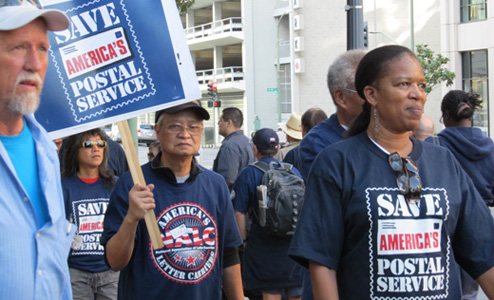
(PAI) – Congress is confronting a major problem: What to do about the future of the U.S. Postal Service – and its 500,000 workers.
On one side are unionists, led by the Letter Carriers, the Postal Workers and the Mail Handlers, who say the reason USPS is running deep in the red is the federal government sitting on billions in previously overpaid pension contributions from USPS to defray future retirement costs. And the GOP Bush regime pushed through a 2006 postal “reform” law that forces USPS to send $5.5 billion every year to the Treasury to prepay future health care costs for future retirees for the next 75 years.
The deficit is not because of the Internet – though that’s a problem threatening money-making first class mail – or the Great Recession, though that has cut mail volume, or because of labor costs, the unions say.
Return the overpaid pension funds and stop the prepayment requirement – there’s already $44 billion of that set aside – and the service runs in the black.
On the other side is USPS management, congressional Republicans and, of course, the anti-worker forces of Big Business and the Radical Right. They use USPS management’s claims that it will lose $15 billion this year – triple what it “lost” last year – to campaign for firing more than 100,000 workers, letting another 100,000 or so go by attrition, killing Saturday delivery and prompt-delivery guarantees and slowing down first-class mail by closing 250 sorting centers.
The House GOP, aided by Sen. John McCain, R-Ariz., would go even farther. They’d appoint a financial dictator to run the USPS, who could close post offices and sorting centers, raise stamp prices, fire workers and trash union contracts.
Congress is caught in the middle, between the claims of USPS financial “losses,” and the fact that cutting workers and service causes pain and sends service down the drain. Sen. Bernard Sanders, Ind-Vt., and 26 allies proposed a solution that avoids the drastic cuts by taking a positive approach: Don’t cut the USPS, but expand its use and usefulness in the Internet Age.
We thought we’d print some of what he had to say during the debate. If you like his ideas – and we do – call your senator.
“The Postal Service needs a new business model,” Sanders told his colleagues. “Right now, if one walks into a post office and says to a postal clerk: ‘Hi. I would like to give you $2 to notarize this letter,’ the postal clerk would say: ‘It is against the law for me to do that. I can’t take your $2.’
‘Postal Clerk, can you make 10 copies of this letter?’ ‘Nope. It is against the law for me to do that.’ ‘Rural Postal Clerk, I would like a fishing license or a hunting license. Can you help me with that?’ ‘I cannot do that. It is against the law.’
‘I want to mail this box of wine and beer.’ ‘I cannot do that. It is against the law.'”
“What we want to do is take away many of the restrictions imposed on the Postal Service by Congress and give them the flexibility to be more entrepreneurial to bring in more revenue,” Sanders said. “We have some 32,000 post offices in America. Today letter carriers deliver mail to about 150 million doors. That is a huge infrastructure.
“If we have some pretty smart entrepreneurial types telling us what we can do in addition to what we are doing now-what the letter carriers can do, what the post offices could do, what the Postal Service can do in terms of new products and services, can we bring in more revenue? I think we can.”
Sanders proposed creating an independent panel of entrepreneurs to recommend other services the USPS could provide, after removing the restrictions he listed. Then he got to the financial point the unions have made.
“No one debates first-class mail is down. A lot of people now use e-mail and the Internet rather than first-class mail. But what many people do not fully understand is the major financial crisis facing the Postal Service is the fact that they have an onerous burden of having to provide $5.5 billion every single year in future retiree health benefits — $5.5 billion every year-imposed upon them in 2006.
“According to the inspector general of the Postal Service, the $44 billion in that account right now is all that it needs because when that accrues interest over a 20-year or so period, it will have enough money to pay out all the future retiree health benefits.
“Furthermore, there is no disagreement the Postal Service overpaid” some $13 billion into federal workers’ retirement funds. It’s owed that money, Sanders said.
“If the Senate is prepared to be bold, to do the right thing, we can save jobs. We do not need to lay off or to downsize the Postal Service by over 200,000 workers. We do not need to shut down over 3,000 rural post offices. We do not need to shut down half of the processing plants in America and slow down mail delivery service leading to an eventual death cycle for the Postal Service.”
“This is not a Democratic issue; this is not a Republican issue,” said Sanders, an independent. “Republicans and Democrats have rural post offices. All know how important they are. All want to save jobs in the middle of a recession. All want the Postal Service to be strong.“
So do we. Sanders’ bill is the way to go. Competing legislation that dismantles the USPS, fires workers, closes centers, slows the mail or trashes union contracts, these are not the way to go. Call your senator and say so. And since the White House has taken no position on the issue – other than to favor cutting out Saturday service – call them, too.
Photo: Postal workers and supporters demonstrate in front of the Oakland, Calif. Federal Building Sept. 27, 2011, during national day of action to save the U.S. Postal Service. Marilyn Bechtel/PW












Comments